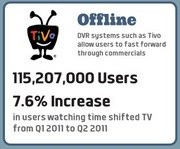What social media marketers need to know about social media ads vs TV ads
Do you sometimes find yourself pondering about life in the "stone age", when you only used your computer for sending and retrieving emails? We tend to believe all we did was lie on our backs and merely gaze at the ceiling before social networks popped up.
Recent survey results from Adap.tv and Digiday suggest that brands are shifting money from their TV and online display budgets to fund increases in online video spending. What about social media budgets? Data from a Wildfire by Google study conducted by Ad Age offers some insights into where large companies are pulling their social media dollars from. Interestingly, traditional media funding is being cannibalised just as much as digital media.

From TV to smartphone
When we were kids we used to cherish television sets to the point where we would have to be forcibly removed and have curfews imposed in order for us to stay away from the sets. Family time was spent watching game shows such as Who wants to be a Millionaire and a host of others as families gathered around one television set.
"People are spending huge amounts of time on social media now, possibly because they are bored, looking to be entertained or they are just hooked on being digitally connected. A lapse in the conversation leads to the inevitable social media check on your smartphone or tablet, which is nearby" - Peg Fitzpatrick.
With the affordability of smartphones, tablets and computers coupled with the accessibility of fast internet connectivity, we have witnessed a drastic reduction in family bonding around a television set. The kids do not believe it is compulsory to be in the lounge any more, due to the fact that they can socialise in the comfort of their bedrooms. Parents only need the TV for their favourite programmes, such as the news and soap operas, then quietly slip into social networking mode to catch up with friends and relatives.
Skipping adverts
"The Personal Video Recorder (PVR) has allowed audiences to record their favourite television shows and skip commercials. The phenomenon called time-shifting is changing the way brands approach TV advertising and it is particularly harmful to those pushing sales promotions as viewers may watch the programme but not necessarily the commercials" - Rob Smuts.
Being afforded the opportunity to record and pause the programme has dealt television adverts a big blow as people are only interested in the programmes they want to watch. Digital television has created a situation where the moment the show you are tuned into goes on an ad break you simply fast forward and ignore the adverts which could be beneficial to us.
Paul Middleton, MD of advertising agency Ebony & Ivory says "viral videos and sponsored programmes are one solution". He says: "We have people choosing to view rather than having content pushed at them. They would rather watch two-minute videos online than a 30-second ad in the middle of the programme."
Advertising to the right audience
Social media adverts and promotions are in your face while you scroll down on your smartphone or laptop. The fact that advertisers can have a buyer persona means they have a higher chance of making an impact as they know to whom they are directing their messages and where those people are situated. The problem with television adverts is that you spend tens of thousands of rands sending your message to simply anyone out there watching the programme you have a slot in.
With social media ads, you have the opportunity to practise repeat exposure without the costly process witnessed on television, and if you keep sending the right messages to your intended audience you will obtain a lead, which will hopefully become a customer and ultimately your brand ambassador.
As opposed to television adverts, social media adverts give your target audience the opportunity to immediately click on your link directing traffic to your website and, using the right tools, you will monitor the number of clicks you have in order to measure the effectiveness of your posts.
Now that the world is shifting their television habits online it means that the video advertising model must shift with it. While the devices are different, the end customer will still be drawn to good video advertising. With the recent announcement that Facebook is introducing Video Ads, we are sure to see a lot of companies reduce their television marketing budgets in favour of this new feature.
About Thabiso Dlamini
- Embrace digital but ignore traditional media at your peril - 1 Feb 2018
- Social TV a benchmark for success - 19 Dec 2016
- How the media played a role in Donald Trump's presidential victory - 9 Nov 2016
- Zuma must fall billboard worth every penny - 19 Jan 2016
- Radio: Still a force to be reckoned with - 28 Apr 2015
View my profile and articles...